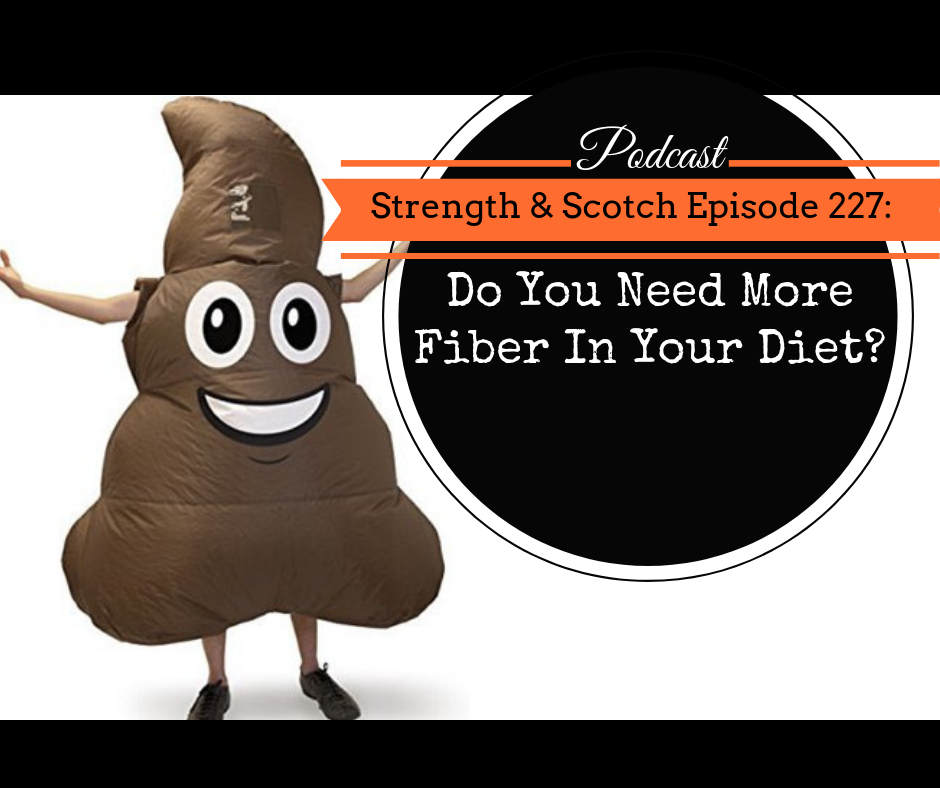Episode 227 Show Notes
Show notes….
Grant and Heavey talk fiber today including the different types of fiber and the effects of fiber on people’s health. We often hear people saying that fiber is super beneficial, so how much fiber should you be consuming everyday?
[02:33] How Hot is Your Coffee or Tea?
Grant presents a recent article mentioning a study about people who drink hot beverages. They found that people who liked drinking their beverage warmer than 60 degrees Celsius, had a 90% higher risk of developing esophageal cancer. The study looked at more than 60,000 people.
[05:42] Fiber: Are You Eating Enough?
Grant also found an article about fiber and realized he didn’t know much about it. So Heavey is going to dive into some details about fiber in today’s episode. The reason for Grant’s sudden interest in fiber is because he’s been eating Quest protein bars. One thing that makes it striking is the high amount of fiber it contains. Sometimes, Grant can consume up to two in a day so he’s wondering whether this is bad or not.
In the article titled, Nearly all Americans failed to eat enough of this actual superfood, they say that only 5% of Americans hit the Institute of Medicine’s recommended fiber target of 25 grams for women and 38 grams for men daily, with the average American getting about 16 grams per day.
Eating a fiber-rich diet is associated with better gastrointestinal health and reduced risk of heart attacks, strokes, high cholesterol, type II diabetes, and even certain cancers.
Heavey points out that people that eat whole grains and mealtime fiber tend to take their health seriously. This means they’re also doing a bunch of other healthy practices like not smoking and exercising – which all factors into them having a lower chance of developing those diseases. It’s difficult to isolate whether or not it’s fiber that’s doing the trick or another piece or some combination of everything. This is the caveat to mention about the article here with regard to the favoritism shown toward fiber.
[09:45] Costco Fibers
There’s a common perspective that fiber is highly beneficial so Heavey is wondering why Grant is worried about eating too much fiber. It’s interesting that the Quest bars have gotten in trouble recently. They were actually labeling something as fiber and they did something sneaky about it.
[11:20] Types of Fibers
There are different types of fibers that are processed differently within the body. Look at any nutrition label and you’ll see Fiber broken down underneath the Carbohydrate heading. It’s broken down separately because they are processed by the body differently than sugars or starches because we don’t absorb them in the same way.
It’s a fair assumption that fibers are mostly undigested. But then again, not all fibers are created equally. Fibers are generally classified based on their solubility – soluble vs insoluble – and their fermentability. Fermentable fibers are foods that sit in the digestive tract and ferment within them. This affects gut bacteria. Functional fibers are fibers that are either industrially processed or synthetic fibers often added to foods and supplements.
[13:38] Insoluble Fiber: The Ultimate Junk Food
Heavey found a paper written back in 2007 where the author refers to insoluble fiber as the ultimate junk food since it’s neither digestible nor absorbable. For instance, put a piece of celery in a glass of water and it just sits there. That’s what happens if celery passes through your digestive tract. Whereas if you mix oatmeal in a glass of water, it becomes sludgy. Hence, solubility is the ability of the fiber to be dissolved in water.
There are some people that use insoluble fiber as a tool to loosen their stool. The idea is that it helps form the sludge that can move things through if they’re feeling constipated. This is one way that some people can use insoluble fiber.
Examples of foods rich in high insoluble fiber include black beans, lima beans, Brussel sprouts, avocados, sweet potatoes, broccoli, turnips, and pears.
[16:50] The Effect of Fiber on Pooping
The effect of fiber on pooping is not as universally beneficial as people would make you think it is. Some people respond very well to fiber in helping them increase the regularity of their pooping. But other people respond adversely and pretty strongly to fibers.
Heavey had a young client who was 6’2 and weighed 140 pounds. His weight was because of some serious digestive distress. He was pooping once a week. So they started the program by taking out all fiber from his diet. In doing so, this helped him get things moving a lot better than before. Then slowly, they added in some soluble fibers and he continued to respond well.
Heavey has had other clients who experienced digestive distress and are not sure what’s going on. They usually take out the highest sources of fiber and they see relief. That being said, this fiber situation is kind of complicated as to whether or not it’s good or bad for you because it can cause a lot of distress for people, especially fermentable fibers.
[20:11] Fermentable Fibers
Fermentable fibers serve as a fuel source for gut bacteria. They sit there and ferment in your digestive tract. It sounds good, but in certain people, it can cause discomfort, gas, and bloating in certain individuals. Just as discussed in last week’s episode, FODMAPs are a group of fermentable carbohydrates that people are sensitive too.
[21:48] The Production of Fatty Acids
Nourishing the gut microbiome is a major line of research now. However, some are making early claims about it. Heavey believes we’re still really early in understanding and connecting the dots.
Nevertheless, it’s common knowledge that short chain fatty acids are produced when certain fibers are fermented in the gut. These fatty acids have been demonstrated to have anti-inflammatory effects to increase insulin sensitivity and even delay the development of neurodegenerative disease. These fatty acids are especially healthy and helpful to the body. All soluble fibers are fermented in the gut. However, it’s really hard to keep everything straight in terms of what’s soluble or insoluble and what’s fermentable or not. There are different types of classifications.
[26:12] What About Fiber Supplementation?
As a starting point, try to consume as much within the context of eating the foods in your diet before supplementing. And if you just can’t do it, add some supplementation. Note that this recommendation is for healthy individuals. If you’ve got some gut issues like irritable bowel syndrome or Crohn’s disease, there may be a need to do supplementation.
Also, you have to be aware of how your body is responding to the fiber. Don’t just accept that you need to go to 38 grams per day when you’re going to feel bloated the entire time. You should prioritize fiber but be aware of how your body is responding to it. Find a way that your body can get fiber without wanting to shit your pants the whole time.
[29:33] Adding Fiber to Your Keto Diet
For instance, following a keto diet can limit your fiber intake quite a bit. And, there are some complications there. Some research suggests that an extended very low carb diet can cause your body to starve out both the good and the bad bacteria in your gut which can cause some digestive issues.
The idea is to calculate your carbs. If you’re not digesting the fiber, you basically subtract that from the carb total because they shouldn’t count. This gets people to prioritize foods with higher fiber within their diet. Nevertheless, while you’re trying to eat low carb, you’ve got to go levels deep before you can say this is a valid approach or not.
[33:15] Please Rate Us!
Please leave a rating or review on iTunes. It only takes a minute or less to do this, and it greatly helps the podcast reach more people. Finally, Heavey reads a recent review from a listener.
Links
Drinking hot tea almost doubles risk of esophageal cancer, new study says
Nearly all Americans fail to eat enough of this actual superfood

Check out the gear page for everything Strength & Scotch! You’ll find a listing of all the supplements and other programs we’ve discussed on the show as well as our killer t-shirts!

